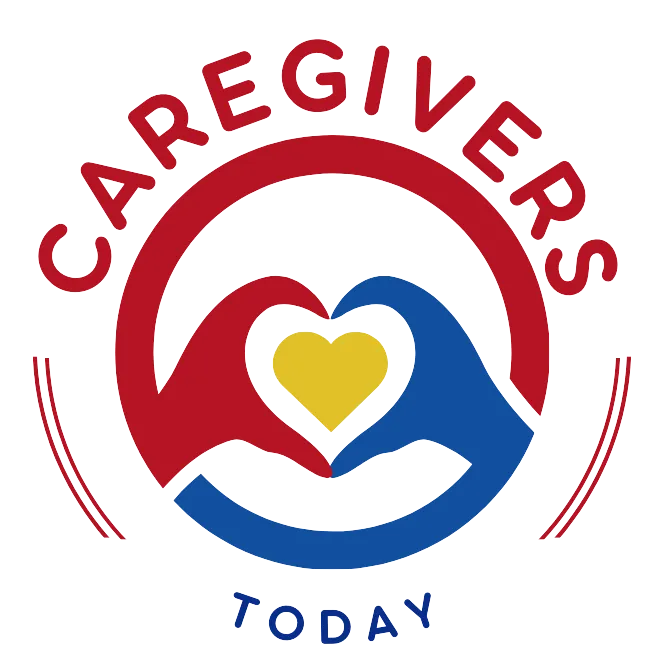
Proven Framework for Success
Our Calm Caregiving Course is designed and facilitated by experts in caregiving, with over two decades of hands-on experience and proven results in mentoring other caregivers.

Practical and Actionable Advice
Our coaches provide practical strategies for managing the day-to-day challenges of caregiving, as well as skills and techniques that can reshape the way you approach caregiving.

Empowered Caregivers
Join a community of caregivers, dedicated to the art of caregiving,
who uplift each other, spread knowledge, and empower every caregiver to provide the best possible care.

20k+Patients

20k+Families

500+Caregivers

About
Caregivers Today
Caregivers Today was launched by Alex J. Buison, to help caregivers by creating a community that can support and uplift each other. It's founded on his commitment to honor the legacy of those who cared for him and his dedication to passing the torch, spreading knowledge, and empowering every caregiver to provide the best possible care.
Are you ready to take control, transform your caregiving journey and become an empowered leader in our community?
Master stress management
Learn practical strategies to manage the day-to-day challenges of caregiving
Improve your quality of life as well as that of the person you're caring for
Reignite your passion
Revolutionize your approach
Acquire the tools and skills to teach and inspire others
Products & Services
Discover Our Top-Rated Skills Elevate Your Expertise with the Best Courses for Learning and Mastering Essential Abilities.
23,000+ more skillful courses you can explore
Upcoming Events
Our affiliate courses are designed by experts who have years of experience and proven results in the affiliate marketing industry.

Building a Support Network: Finding Help and Community
Introduction
Caregiving for a loved one with dementia is a journey that is often filled with challenges, stress, and emotional turmoil. While it’s natural for caregivers to feel a deep sense of responsibility, it’s important to recognize that no one should have to face the demands of caregiving alone. Building a robust support network is not only beneficial but essential for the well-being of both the caregiver and the person with dementia. In this blog, we’ll explore the importance of creating a support system and provide practical advice on how to find and cultivate the help and community you need to navigate the caregiving journey.
Finding Support

Family and Friends
Family and friends are often the first line of support for caregivers, but knowing how to effectively involve them in caregiving tasks can be a challenge. Many caregivers hesitate to ask for help, fearing they may burden others or that their loved one’s needs are too complex for others to handle. However, involving family and friends can significantly lighten your load and provide much-needed emotional support.
Here are some tips for engaging your family and friends:
Communicate Openly: Start by having honest conversations with your family and friends about your caregiving responsibilities. Let them know what you’re going through and express your need for help. Sometimes, people are willing to assist but don’t know how or when to step in.
Delegate Tasks: Identify specific tasks that others can help with, such as grocery shopping, cooking meals, or providing transportation to medical appointments. Delegating these tasks not only reduces your workload but also allows others to contribute in meaningful ways.
Rotate Responsibilities: If possible, establish a rotation schedule with family members where caregiving duties are shared. This could involve taking turns to spend time with your loved one, giving you regular breaks to rest and recharge.
Involve Friends in Social Activities: Encourage friends to visit or take your loved one out for a few hours. Social interaction is beneficial for both the caregiver and the person with dementia, and it provides you with some time for yourself.
By actively involving family and friends, you can create a strong foundation of support that helps you manage the demands of caregiving more effectively.
Support Groups
Support groups offer a unique opportunity for caregivers to connect with others who are experiencing similar challenges. These groups, whether local or online, provide a safe space to share experiences, exchange advice, and offer encouragement. The sense of community and understanding that comes from participating in a support group can be incredibly comforting and empowering.
Here’s how to find and benefit from support groups:
Local Support Groups: Many communities have local support groups for dementia caregivers. These groups often meet regularly and provide a chance to connect face-to-face with others who understand what you’re going through. Check with local hospitals, community centers, or Alzheimer’s organizations for information on groups in your area.
Online Support Groups: If attending in-person meetings is difficult due to time constraints or location, online support groups are a great alternative. Many online platforms host forums, chat rooms, and social media groups where caregivers can share experiences and seek advice from others around the world. These virtual communities can be accessed from the comfort of your home, providing flexibility and convenience.
Specialized Groups: Some support groups are tailored to specific aspects of caregiving, such as groups for adult children caring for parents, spouses caring for partners, or those dealing with specific types of dementia. Finding a group that closely aligns with your situation can provide more targeted support and resources.
Participating in a support group can reduce feelings of isolation, provide valuable insights, and offer a sense of solidarity that comes from knowing you’re not alone in your caregiving journey.
Professional Help
There may come a time when the demands of caregiving exceed what you can handle on your own, even with the support of family, friends, and support groups. In these situations, seeking professional help is a wise and necessary step to ensure the well-being of both you and your loved one.
Here’s how to approach finding professional assistance:
Home Health Aides: Hiring a home health aide can provide much-needed relief by assisting with daily caregiving tasks such as bathing, dressing, and meal preparation. These professionals are trained to care for individuals with dementia, allowing you to step back and take care of your own needs.
Respite Care: Respite care offers temporary relief for caregivers by providing short-term care for your loved one. This can be in the form of in-home respite care, adult day care centers, or short-term stays at a residential care facility. Respite care allows you to take a break, knowing that your loved one is in capable hands.
Geriatric Care Managers: A geriatric care manager is a professional who specializes in helping families navigate the complexities of elder care. They can assess your loved one’s needs, coordinate care services, and provide guidance on financial and legal matters related to caregiving.
Therapists and Counselors: The emotional toll of caregiving can be heavy, and seeking support from a therapist or counselor who specializes in caregiver stress can be incredibly beneficial. Therapy can provide a space to process your emotions, develop coping strategies, and maintain your mental health.
Professional help is an important part of a comprehensive support network, providing specialized care and expertise that can alleviate some of the pressures of caregiving.
Benefits of a Support Network

Emotional Support
A strong support network offers invaluable emotional support, which is crucial for managing the stresses and challenges of caregiving. Caregivers often experience a wide range of emotions, from frustration and sadness to guilt and helplessness. Having a network of people who understand what you’re going through can help you process these emotions and provide comfort during difficult times.
Emotional support from a network can also help you maintain a positive outlook, which is essential for sustaining your caregiving efforts over the long term. Whether it’s a sympathetic ear from a friend, a word of encouragement from a support group member, or professional guidance from a therapist, the emotional support you receive can make a significant difference in your well-being.
Shared Knowledge
Connecting with others who are also on the caregiving journey provides access to a wealth of shared knowledge and experience. Every caregiver’s situation is unique, but there are often common challenges and solutions that can be shared within a support network. This collective wisdom can help you navigate complex caregiving situations more effectively.
By sharing experiences, tips, and resources, you can learn new strategies for managing behaviors, improving communication, and finding local services. The knowledge gained from others in your support network can enhance your caregiving skills and provide practical solutions to the challenges you face.
Respite Opportunities
One of the most important benefits of a support network is the opportunity for respite. Caregiving is a demanding role that requires constant attention and effort, making it easy to become physically and emotionally drained. A support network can provide the relief you need by offering options for respite care.
Whether it’s a family member stepping in for a few hours, a friend taking your loved one out for a day, or professional respite services, having a support network means you don’t have to do it all on your own. Taking regular breaks is essential for preventing burnout and ensuring that you can continue to provide quality care.
Conclusion
Building a support network is one of the most important steps you can take as a caregiver for a loved one with dementia. By involving family and friends, joining support groups, and seeking professional help when needed, you create a robust system that supports both you and your loved one.
A strong support network provides emotional support, shared knowledge, and opportunities for respite, all of which are essential for maintaining your well-being and effectiveness as a caregiver. Remember, you don’t have to face the challenges of caregiving alone—reach out, connect with others, and build the community of support that will sustain you on your caregiving journey.
News & Updates

Building a Support Network: Finding Help and Community
Introduction
Caregiving for a loved one with dementia is a journey that is often filled with challenges, stress, and emotional turmoil. While it’s natural for caregivers to feel a deep sense of responsibility, it’s important to recognize that no one should have to face the demands of caregiving alone. Building a robust support network is not only beneficial but essential for the well-being of both the caregiver and the person with dementia. In this blog, we’ll explore the importance of creating a support system and provide practical advice on how to find and cultivate the help and community you need to navigate the caregiving journey.
Finding Support

Family and Friends
Family and friends are often the first line of support for caregivers, but knowing how to effectively involve them in caregiving tasks can be a challenge. Many caregivers hesitate to ask for help, fearing they may burden others or that their loved one’s needs are too complex for others to handle. However, involving family and friends can significantly lighten your load and provide much-needed emotional support.
Here are some tips for engaging your family and friends:
Communicate Openly: Start by having honest conversations with your family and friends about your caregiving responsibilities. Let them know what you’re going through and express your need for help. Sometimes, people are willing to assist but don’t know how or when to step in.
Delegate Tasks: Identify specific tasks that others can help with, such as grocery shopping, cooking meals, or providing transportation to medical appointments. Delegating these tasks not only reduces your workload but also allows others to contribute in meaningful ways.
Rotate Responsibilities: If possible, establish a rotation schedule with family members where caregiving duties are shared. This could involve taking turns to spend time with your loved one, giving you regular breaks to rest and recharge.
Involve Friends in Social Activities: Encourage friends to visit or take your loved one out for a few hours. Social interaction is beneficial for both the caregiver and the person with dementia, and it provides you with some time for yourself.
By actively involving family and friends, you can create a strong foundation of support that helps you manage the demands of caregiving more effectively.
Support Groups
Support groups offer a unique opportunity for caregivers to connect with others who are experiencing similar challenges. These groups, whether local or online, provide a safe space to share experiences, exchange advice, and offer encouragement. The sense of community and understanding that comes from participating in a support group can be incredibly comforting and empowering.
Here’s how to find and benefit from support groups:
Local Support Groups: Many communities have local support groups for dementia caregivers. These groups often meet regularly and provide a chance to connect face-to-face with others who understand what you’re going through. Check with local hospitals, community centers, or Alzheimer’s organizations for information on groups in your area.
Online Support Groups: If attending in-person meetings is difficult due to time constraints or location, online support groups are a great alternative. Many online platforms host forums, chat rooms, and social media groups where caregivers can share experiences and seek advice from others around the world. These virtual communities can be accessed from the comfort of your home, providing flexibility and convenience.
Specialized Groups: Some support groups are tailored to specific aspects of caregiving, such as groups for adult children caring for parents, spouses caring for partners, or those dealing with specific types of dementia. Finding a group that closely aligns with your situation can provide more targeted support and resources.
Participating in a support group can reduce feelings of isolation, provide valuable insights, and offer a sense of solidarity that comes from knowing you’re not alone in your caregiving journey.
Professional Help
There may come a time when the demands of caregiving exceed what you can handle on your own, even with the support of family, friends, and support groups. In these situations, seeking professional help is a wise and necessary step to ensure the well-being of both you and your loved one.
Here’s how to approach finding professional assistance:
Home Health Aides: Hiring a home health aide can provide much-needed relief by assisting with daily caregiving tasks such as bathing, dressing, and meal preparation. These professionals are trained to care for individuals with dementia, allowing you to step back and take care of your own needs.
Respite Care: Respite care offers temporary relief for caregivers by providing short-term care for your loved one. This can be in the form of in-home respite care, adult day care centers, or short-term stays at a residential care facility. Respite care allows you to take a break, knowing that your loved one is in capable hands.
Geriatric Care Managers: A geriatric care manager is a professional who specializes in helping families navigate the complexities of elder care. They can assess your loved one’s needs, coordinate care services, and provide guidance on financial and legal matters related to caregiving.
Therapists and Counselors: The emotional toll of caregiving can be heavy, and seeking support from a therapist or counselor who specializes in caregiver stress can be incredibly beneficial. Therapy can provide a space to process your emotions, develop coping strategies, and maintain your mental health.
Professional help is an important part of a comprehensive support network, providing specialized care and expertise that can alleviate some of the pressures of caregiving.
Benefits of a Support Network

Emotional Support
A strong support network offers invaluable emotional support, which is crucial for managing the stresses and challenges of caregiving. Caregivers often experience a wide range of emotions, from frustration and sadness to guilt and helplessness. Having a network of people who understand what you’re going through can help you process these emotions and provide comfort during difficult times.
Emotional support from a network can also help you maintain a positive outlook, which is essential for sustaining your caregiving efforts over the long term. Whether it’s a sympathetic ear from a friend, a word of encouragement from a support group member, or professional guidance from a therapist, the emotional support you receive can make a significant difference in your well-being.
Shared Knowledge
Connecting with others who are also on the caregiving journey provides access to a wealth of shared knowledge and experience. Every caregiver’s situation is unique, but there are often common challenges and solutions that can be shared within a support network. This collective wisdom can help you navigate complex caregiving situations more effectively.
By sharing experiences, tips, and resources, you can learn new strategies for managing behaviors, improving communication, and finding local services. The knowledge gained from others in your support network can enhance your caregiving skills and provide practical solutions to the challenges you face.
Respite Opportunities
One of the most important benefits of a support network is the opportunity for respite. Caregiving is a demanding role that requires constant attention and effort, making it easy to become physically and emotionally drained. A support network can provide the relief you need by offering options for respite care.
Whether it’s a family member stepping in for a few hours, a friend taking your loved one out for a day, or professional respite services, having a support network means you don’t have to do it all on your own. Taking regular breaks is essential for preventing burnout and ensuring that you can continue to provide quality care.
Conclusion
Building a support network is one of the most important steps you can take as a caregiver for a loved one with dementia. By involving family and friends, joining support groups, and seeking professional help when needed, you create a robust system that supports both you and your loved one.
A strong support network provides emotional support, shared knowledge, and opportunities for respite, all of which are essential for maintaining your well-being and effectiveness as a caregiver. Remember, you don’t have to face the challenges of caregiving alone—reach out, connect with others, and build the community of support that will sustain you on your caregiving journey.
What Our Customers Are Saying

"As a new caregiver, I was overwhelmed and unsure of where to start until I joined Caregivers Today. Their expertise, patience, and practical advice have equipped me with the skills and confidence I needed to provide the best care possible. I highly recommend their Calm Caregiving Course to any new caregiver seeking guidance and support."

Cody

"Before joining Caregivers Today, I was completely burned out and struggling to manage my caregiving responsibilities. Their insightful guidance and empathetic approach not only rejuvenated my passion for caregiving but also provided me with effective techniques to prevent burnout. I highly recommend the Calm Caregiving Course to any caregiver in need of support and revitalization."

Kristin

"Being part of the Caregivers Today community has been a game-changer for me. Their deep knowledge, strategic insights, and encouragement have empowered me to not only enhance my caregiving skills but also to inspire and support others in my community. I highly recommend their training to any caregiver aspiring to make a broader impact."

Albert
Are you ready to take control, transform your caregiving journey and become an empowered leader in our community?
Our affiliate courses are designed by experts who have years of experience and proven results in the affiliate marketing industry.
Frequently Asked Questions
Let's answer any of your questions
Can I get paid to care for a family member?
We receive hundreds of calls every year from family and friends asking, “How can I get paid to care?” These caregivers aren’t asking for a handout, they are simply trying to find a way to make ends meet while dedicating their time to caregiving. Unfortunately, very few programs pay family members or friends on a regular basis to provide care. Medicare (government health insurance for people age 65 and older) does not pay for long-term care services, such as in-home care and adult day services, whether or not such services are provided by a direct care worker or a family member. Sometimes, however, caregiving families may obtain financial relief for specific purposes, such as for respite care or to purchase goods and services, and in some cases, pay for caregiving. In some states there are programs that pay family members to provide care to those receiving Medicaid (government health insurance for low-income people — this program may go by a different name in your state). And in a very few states there are programs available to those who do not qualify for Medicaid. NOTE: These programs vary widely, often with complicated criteria for eligibility.
How can I find someone to help care for my family member at home?
Many older or disabled adults live at home but need daily assistance with a broad range of activities such as bathing, dressing, eating and taking their medications. They may also need assistance with household chores, such as cooking, cleaning and laundry. As a friend or relative, you may find it difficult to provide all of that help on your own. If you are providing care on a daily, weekly or even monthly basis, you may find that you need help or need a break. A variety of services are available to assist you and your family member.
Generally, two types of care in the home are available: home health care services and in-home care services. If your family member requires regular assistance with health care needs, home health care organizations and skilled nursing agencies may be the best choice for you. They can provide a range of medical services, such as medication assistance, nursing services, physical therapy and medical social services to coordinate care among health care providers. Medicare, Medicaid and a number of private insurance policies pay for some home health care services, with certain restrictions. For example, Medicare will cover limited home health care for homebound beneficiaries who need intermittent skilled nursing or therapy services as prescribed by a physician. Many families, however, have to pay out of pocket for home health care services.
How can I deal with my family member’s challenging behaviors without losing my patience?
People with cognitive impairment may exhibit a range of frustrating behavioral problems. These might include communication difficulties, becoming fixated on an idea or constantly repeating a question, aggressive or impulsive behaviors, paranoia, lack of motivation, memory problems, incontinence, poor judgment and wandering. Common causes of cognitive impairment include Alzheimer’s disease and related dementias, stroke, Parkinson’s disease, brain injury, brain tumor or HIV-associated dementia.
Various strategies can help you deal with challenging behaviors. In many communities, the Family Caregiver Support Program or another community organization offers classes and training sessions that teach skills useful in handling troublesome behavior. There you can receive information about your relative’s ability to understand and communicate. Joining a support group also can be helpful. A support group is a good place to share your frustrations and discuss coping strategies with people who are in the same situation, caring for their family members or friends. While many support groups meet in person, online and telephone groups also exist.
It’s important to remember that it’s the disease, not the person, causing the behavior. Anticipating that there will be ups and downs through the illness can provide important perspective to help, maintain your patience. Compassion and a sense of humor also may enable you to cope more effectively with difficult behavior.



